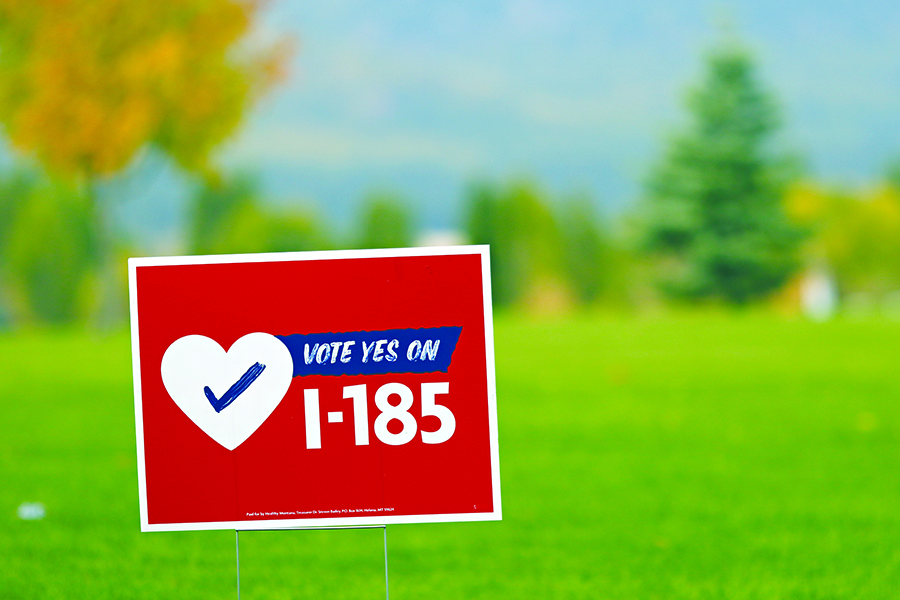In case you’ve missed the flurry of industry-funded opposition ads targeting a pair of Montana citizens’ initiatives — one to raise the state’s tobacco tax, the other to add new mining regulations — here’s the skinny on what the passage or failure of these measures mean for Montana.
Both ballot initiatives were certified by the Montana Secretary of State after they qualified with more than the required 25,000 valid signatures in support.
Initiative 185
This citizens’ initiative would raise the tax on tobacco products to pay for Montana’s share of Medicaid expansion, which expires next year if state lawmakers don’t extend it.
Jason Cohen, chief medical officer for North Valley Hospital, and Jason Spring, chief strategic officer at Kalispell Regional Healthcare, have been making the case for why the initiative is so important in presentations throughout the community.
Not only will the initiative save lives and money by reducing the toll of cancer and heart disease on Montana residents and the state’s economy, they say, but it will prevent nearly 100,000 Montanans from losing their health care coverage, including 18,000 patients in this service area.
But as Election Day approaches, one tobacco giant alone has spent more than $12 million on ads opposing the measure, funneling the money to a committee called Montanans Against Tax Hikes, which spent an average of $895,000 per week in September and October in a campaign to defeat Initiative 185.
If passed, I-185 would make the state’s Medicaid expansion (which is set to sunset in summer 2019) permanent and would fund the expansion by increasing the tax on cigarette packs from $1.70 to $3.70.
The initiative would also impose a new 33 percent tax on the wholesale price of vaping products and electronic cigarettes, along with a new tax on tobacco snuff.
It’s estimated that the additional tobacco tax would generate around $74.3 million in revenue by 2023. That money would go toward health-care programs and traditional Medicaid, in addition to veteran services, tobacco prevention and the state’s general fund, with $26 million slated to go toward the state’s share of the cost of Medicaid expansion.
Despite generating high-ticket campaign spending for a ballot initiative, Cohen said for him and his colleagues in the health care industry, I-185 isn’t political.
“This initiative is not about politics for me. It’s about health care,” Cohen said. “All of our physicians work in health care, and we wouldn’t be talking about initiatives or politics at all except that the future of our health care is on the ballot. Basically, when almost 20,000 patients’ health care access is on the line, we will go to bat for that.”
Also going to bat for the initiative is Montana Gov. Steve Bullock, a Democrat who has touted Montana’s Medicaid expansion as an overwhelming success, and who spoke Oct. 15 to patients, health care providers, youth activists, and other stakeholders at North Valley Hospital in Whitefish.
Bullock said Medicaid expansion in Montana has dramatically lowered Montana’s uninsured rate down to 7 percent from 20 percent and reduced uncompensated care costs by close to 50 percent.
If the initiative fails to pass, Bullock said Montana would again face a challenging legislative session next year, while its passage includes funding for smoking cessation programs and veteran suicide prevention.
Cohen said tobacco-related diseases cost Montana employers $369 million in lost productivity each year, and that creating a deterrent and continuing to fund Medicaid will benefit the economy.
“Economically Medicaid expansion has been a huge success for the state, and for patients it has been a huge success particularly when you see the preventative care figures,” Cohen said.
There has also been an increase in the number of people who were previously unemployed due to disabilities going back to work, he said.
Prior to Medicaid expansion, Spring said patients were less inclined to seek out preventative care until it was too late, whereas now more patients are showing up for regular check-ups and receiving care coordination.
Both the Kalispell and Whitefish chambers of commerce have endorsed I-185.
Initiative 186
This initiative would require new hard-rock mines to make plans that avoid the perpetual cleanup of polluted water after the mines shut down operations.
Groups on both sides of it accuse their opponents of trying to influence voters with money coming from people who either don’t live in Montana or don’t support the state’s economy and culture.
I-186 would require the state Department of Environmental Quality to deny a new mining permit unless it finds clear and convincing evidence that the mining operation would not cause pollution that would require perpetual treatment.
Supporters are quick to point out that the initiative would not affect existing mines that are operating.
Dave Perkins, the vice chairman of Orvis, the high-profile fly-fishing company, lives in Montana and has emerged as a prominent backer of I-186 because he says it will help protect clean water by enacting more reasonable mining regulations requiring perpetual treatment of mine wastewater.
Opponents say the initiative will jeopardize the state’s mining future, and that environmental protection can coexist with a strong mining industry.
The economic impact of the Montana mining industry reaches across the state. According to a study conducted by the University of Montana, mining employs some 12,300 workers and generates nearly $200 million in annual revenue for state and local governments.
